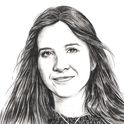I meet Hayley Bennett in a café in Clapham, and she immediately asks to leave. Outside, she tells me the man at the next table was ranting to his friends that Muslims provoke violence by not respecting Christmas. “I don’t even know what point he was trying to make. He said it was a philosophical debate.”
I ask Bennett if she considered confronting him. “I was quite close to it,” she says. “But I always say, think about how safe you’re going to be. Given that there were three of them, you’d have to have some kind of way out.” In a safer environment, how would she advise challenging racism? “I would go into intellectual conversation, point by point,” she says. “I wouldn’t go straight in and be like, ‘you’re out of order’. It could flare up more anger.”
People are somewhat motivated by shame, but it doesn’t lead to genuine commitment
Bennett is a freelance diversity and inclusion consultant, advising companies, schools, sports organisations and recently, ITV’s dating programme Love Island, which started its winter season in mid-January. In response to criticism that the show lacks inclusivity, last summer ITV brought in experts—including Bennett and disability activist Shani Dhanda—to film a workshop, teaching future contestants how to spot microaggressions and discrimination while on-screen, and how to deal with public scrutiny after the show ends. “You might make a mistake either on-screen or during your time as a celebrity after,” she told them. “How do you hold yourself and others accountable for the language you use, for your behaviour?”
Bennett has specialised in diversity, equity and inclusion for a decade. After studying politics at Soas, in 2013 she joined Kick It Out, an organisation that tackles discrimination in football. Bennett inherited a love of the sport—and Arsenal—from her dad, but her allegiance is a reminder of racism in the game. Her father grew up in east London near West Ham’s stadium, but he wasn’t able to support his local team: “When he was growing up, to be a black guy going to West Ham was not on,” she tells me. With her friend Ammarah Pandor, Bennett now runs Nutmegs, a community group for women, trans people and non-binary people of colour to attend games together and feel safe and included.
Bennett started her own diversity consultancy in 2020. She has provided advice to more than 200 organisations, including the Premier League, leading workshops, interviewing employees and counselling on how to lead a diverse workforce. “My brand is quite progressive,” she says. “I tend to work with organisations that already get it to a point, and want to do better.”
However, she’s wary of companies that might hire a diversity consultant in order to do damage control after a scandal. In the past, Bennett has sensed palpable tension and embarrassment within a company she’s worked with. “I would always see that as a red flag,” she says. “People are somewhat motivated by shame, but it doesn’t lead to real, genuine commitment.”
Bennett had similar doubts about working for Love Island. She is not a fan of the programme, which has been heavily criticised over racist and misogynistic incidents—as well as for failing to support contestants (two have died by suicide a few years after appearing on the show)—since it first aired in 2015. “Ultimately, Love Island was going to happen whether I was involved or not. I thought I could add something.” And she’s pragmatic about what she can achieve. “A lot of people who do my job feel like they’re out there to change the world,” she says. “I don’t think the work that I do is going to completely undo colonialism, all our history”—but hopefully, with each small step, she’s changing people’s minds.













